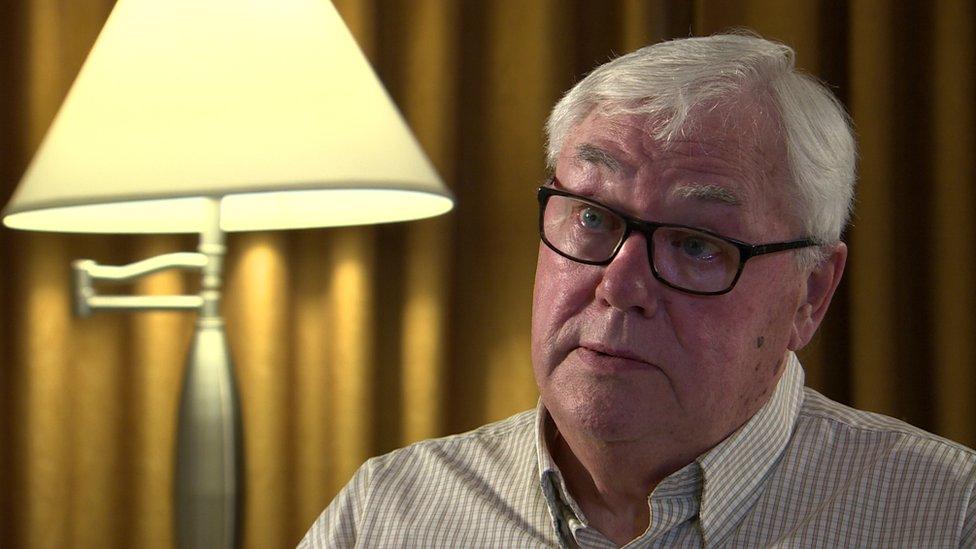Former minister gets suspended sentence over historical child sex abuse
- Published

James Henry Clarke, pictured in 2017, when being interviewed by the BBC
A former minister who was extradited from Canada to Northern Ireland has been sentenced to two years in jail, suspended for three years, for a number of historical child abuse offences.
James Henry Clarke, 81, with an address at Cloncore Road, Portadown, County Armagh, appeared before Belfast Crown Court on Thursday.
He was charged with three counts of indecently assaulting two teenage boys in the 1960s and 1970s.
Clarke was extradited in September.
An international arrest warrant had been issued for him.
Clarke admitted abusing two teenage boys who were living in care homes where he worked.
The court heard the first victim was abused on two occasions between January 1966 and 1972 while he was staying at Bawnmore House in Newtownabbey.
One incident happened when the victim was in bed feeling unwell and the second incident happened at Clarke's mother's home.
Admissions to police
The victim had contacted the Royal Ulster Constabulary (RUC) in 1980 and alleged he had been abused by Clarke when he was 13 years old.
Following this complaint, police officers travelled to Canada and spoke to Clarke about the allegations which he denied. At this stage, no decision was taken to prosecute him.
Five years later Clarke was interviewed by police about an unrelated matter but he then admitted abusing the teenager at Bawnmore House.
The court also heard that the second victim was abused on a date between May 1970 and May 1974 at Conway House children's home in County Antrim.
In 1985 Clarke admitted to abusing this victim whilst he was a deputy senior matron at the home, in a letter to the RUC officer who had previously interviewed him in Canada in 1980.
The victim told the police he was around 13 years old when the incident occurred on a fishing trip in Newcastle.
No action was taken against Clarke on this occasion either, despite his confession.
BBC interview
In 2017 BBC Newsline travelled to Canada and tracked down Clarke and interviewed him about the abuse allegations which had come to light through the Historical Institutional Abuse Enquiry.
He admitted to the organisation that he did abuse two boys in Belfast in the 1960s and 1970s.
Clarke also told the BBC he admitted the abuse to police but no action was taken against him.
Following this, the Public Prosecution Service launched extradition proceedings.
The court heard that after emigrating to Canada in 1977 Clarke became a church minister.
As part of his work there, he was involved in a child-abuse inquiry and also helped set up a home for boys.
The court heard that at no point were the Canadian authorities made aware of the allegations against Clarke in Northern Ireland.
Defence barrister Michael Boyd told the court that the extradition was a "harrowing experience" for his client who spent more than 40 days in detention in Canada before being brought to Northern Ireland.
'Ashamed and sorry'
Mr Boyd mentioned Clarke's complex medical conditions, as well as caring responsibilities he and his 83-year-old wife have for one of their sons who requires extensive care.
He said that Clarke was "ashamed and deeply sorry" for what he did, adding that he did everything to "facilitate the prosecution of himself by virtue of his confessions".
Judge Reel said that after reading statements from the two complainants "both men speak of the long-lasting memories of the abuse that they suffered at the hands of this defendant".
He added: "They say those memories effect every day of their existence."
The judge said he taken into considerations Clarke's admissions of guilt, his caring responsibilities in Canada and his health issues.
Also noted by the judge was no evidence of further offending in Canada "despite his access to children".
Addressing Clarke as he stood in the dock, Judge Reel imposed the suspended sentence and warned Clarke of the consequences should be re-offend within the next three years.
- Published6 April 2017
